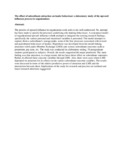| dc.description.abstract | The process of upward influence in organization work units is not well understood. No. attempt has been made to specify the processes underlying role-making behaviours. A conceptual model of organizational upward influence which attempst to integrate the existing research findings, specifically the various personal and situational variables is presented. The model attempts to capture, from a subordinate's vantage point, some of the bsic processes associated with reward and punishment behaviours of leaders. Hypothesis was developed from the model linking attraction with Leader-Member Exchange (LMX) and various subordinate outcomes such as promotion, pay raise, etc. The study was conducted in a laboratory setting. 54 postgraduate students participated as subjects. Overall, the results supported the major prediction. The main finding was that attraction, to a large extent, did not have direct effect on subordinate outcomes. Rather, it affected these outcome variables through LMX. Also, there were cases where LMX depended on attraction for its effects on the various subordinate outcome variables. The results were discussed in terms of the relative predictive power of attraction and LMX and the interraction between them. Implications of the study for research and practice are outlined and future research directions sugggested | en |

